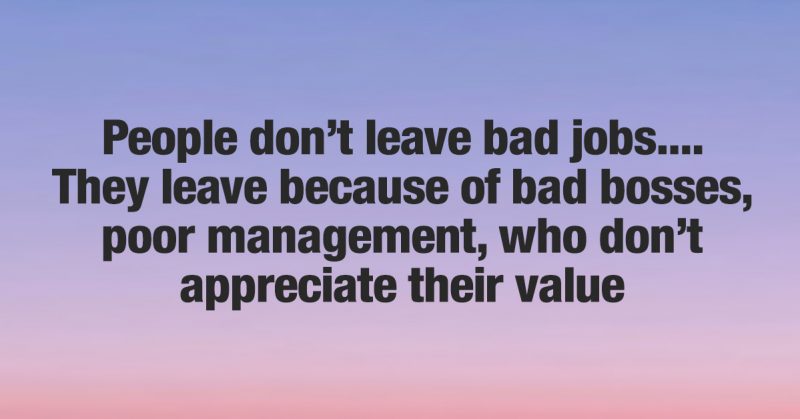Kind bosses are far too underappreciated. If you are an employee working under someone kind, understanding, accommodating, and considerate, while still pushing you to be the best version of yourself, then you should consider yourself very lucky. Good bosses are actually quite rare.
In February 2019 alone, 2.86 million Americans quit their jobs, according to the Bureau of Labor Statistics (BLS), and it’s more than just about poor paychecks. [1]
There are many reasons why people can decide to quit their job, some of which include requiring more time to focus on another phase of life, such as childbirth, securing a better-paying job, relocation, illness, and a few others. However, one of the most common and least-admitted reasons is bad leadership. It’s horrifying to be stuck working for someone who undervalues your efforts and doesn’t give you room for personal development — a micromanager who just thinks you are not good enough to be given the chance to prove yourself. [2]
Bosses who yell at employees, embarrass them in front of co-workers, and undermine their efforts will easily create an unhealthy working environment. Top-tier officers who choose to underpay staff, overwork and keep them stuck at a certain level would not only impede the employee’s personal progress, but also the growth of the company. It’s often worse when these employees are passionate about their careers. This passion is eventually snuffed out and they are left with nothing but the burdening will to survive in a cold, hard world.
A person who works under a great and kind employer would be reluctant to leave the company or establishment, even if a better-paying job comes along. That’s how important it is to treat your employees kindly. This doesn’t mean that an employer should overlook incompetence or ignore an employee’s inadequacies, but it’s essential to treat them with respect while allowing them to grow and learn. [3]
Case in point: Penelope
When I first started taking writing jobs a few years ago, I was a lot younger with less experience and a poor understanding of self-worth. I was excited to finally be earning “something” for my work, prompting my first employer to take advantage of me in ways too cruel to describe. I was working for his blog as a product review writer and in one week, I would do the work meant for an entire writing team. I never complained because I was convinced the remote nature of the job was the only option for a college student. I was making enough to buy meager lunches and second-hand books in school, but that was just about it.
For a group of 10 products, I would be given three days to write 4,000-word reviews for each one. My boss paid me in Pence for hundreds of words and whatever was the meager accumulation in Pounds, I had to deal with it. It actually hurts to think about it now. I was going for days without sleep, nights without rest. I never got a word of encouragement but the criticism was always loudly noted. My boss had no vision for me. I was just there to deliver and promote his business.
Following a near passing-out episode at a Laundromat, I decided it was time to reevaluate my life. I was giving so much, writing so hard, improving my marketing and reviewing skills by reading countless technical books so I could write better, and going far too hard. Still, I was a dispensable, low-level, employee who turned in piles of work and took her Penced-up Pounds.
So, I quit. I quit because I couldn’t deal with the emotional and mental torture anymore. I quit because I finally learned my worth and I was tired of being undervalued. I quit because I deserved better.
I’ve worked for a few other people since then, but now, I’m giving all my energy to improving myself while working with the best employers anyone could ever have. A team of excellent and revolutionary leaders who do not see their employees as staff but as a team, one where everyone is given full credit for their work. They run a flat architecture where team members are required to give their best while having their skills honed, rather than their work micromanaged. There’s a difference, believe me. Team members in this space are not overloaded with excess assignments but are given room to work freely and produce the best output.
Employee welfare is as important as the company’s progress, and I can only be increasingly inspired to give my best.
Bad bosses can lead to ill health
A lot of physically exhausting jobs are not necessarily bad. However, bad management and abusive bosses can make you desperately sick. When you work with a boss who guilt-trips you, manipulates you, and even pulls gaslighting stunts on you, it’s only a matter of time before you begin to fracture mentally. [4]
To every employer out there or anyone who is a top officer at their workplace, lower-level employees are looking up to you for guidance and tutelage, not harassment and micromanagement. You can correct them without yelling, teach them without belittling words, and guide them without letting everyone else know they still have a long way to go.
Give them room when they are overloaded, consider their personal problems, and try to work around helping them find a balance. This doesn’t mean you should stall the progress of your company to accommodate an unavailable employee. However, it wouldn’t hurt so much to help them find a work-life balance.
Underpaying your employees is simply taking advantage of them. No one will thrive in an environment where they are undervalued. Pay them their due earnings — on time — and let them know how valuable they are. A recent study says that 56% of employees would turn down a 10% raise to stay with a great boss.
Good bosses are blessings from above and should always be appreciated.
References
- “WHY THEY ‘QUIT YOU’ Top Reasons an Employee Leaves.” PayScale. Retrieved July 16, 2020.
- “Why People Really Quit Their Jobs.” HBR. Lori Goler , Janelle Gale , Brynn Harrington and Adam Grant. Retrieved July 16, 2020.
- “People Don’t Leave Bad Jobs, They Leave Bad Bosses: Here’s How To Be A Better Manager To Maintain And Motivate Your Team.” Forbes. Jack Kelly. Retrieved July 16, 2020.
- “There’s a name for the tactic manipulative people use in relationships to screw with your sense of reality. Insider. Lindsay Dodgson. Retrieved July 16, 2020.


